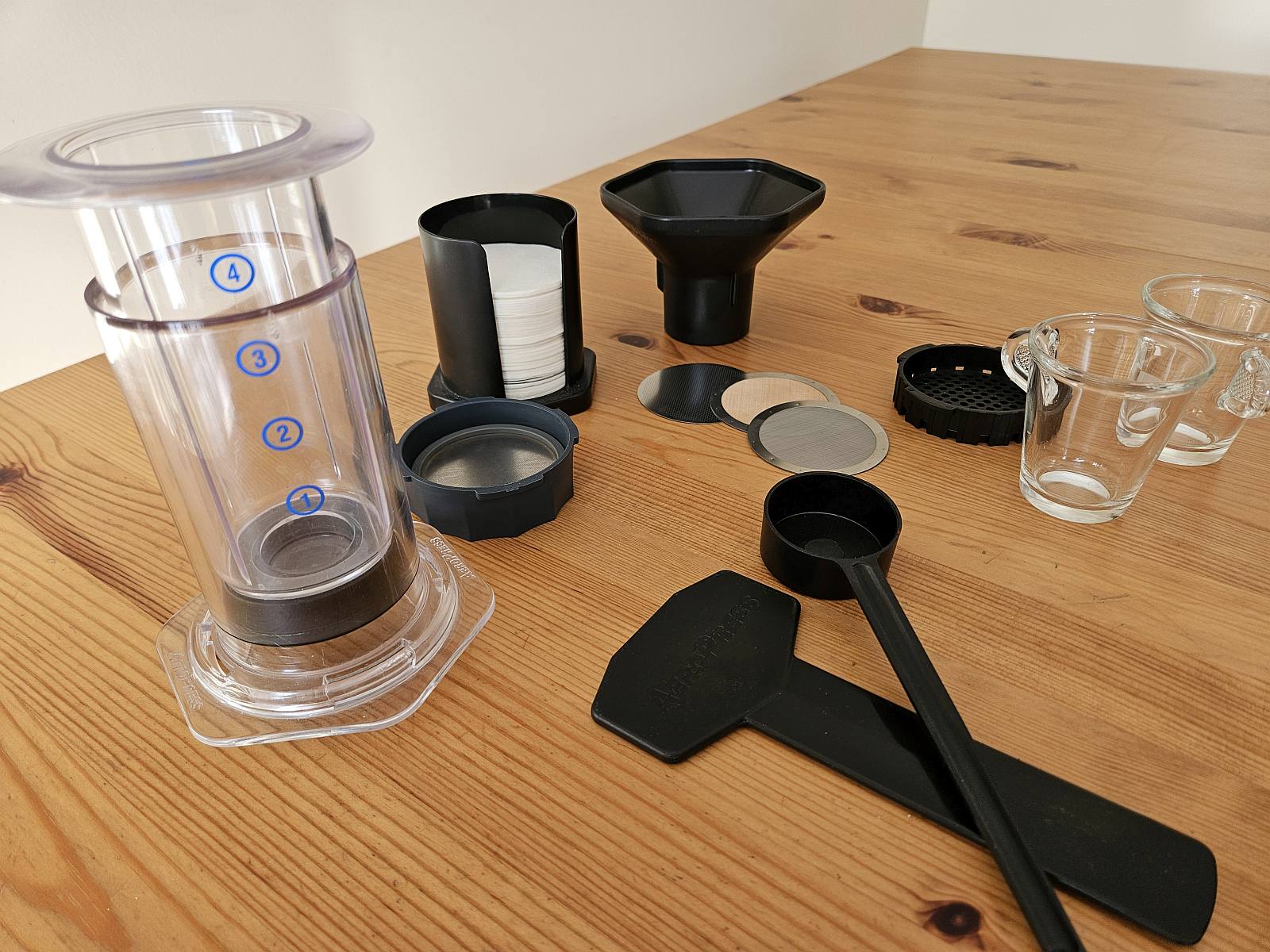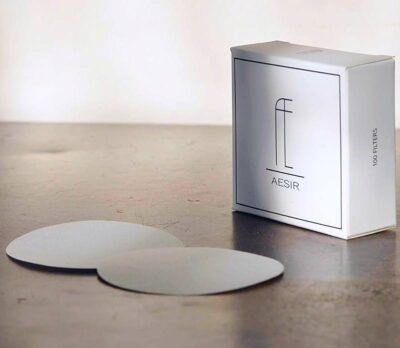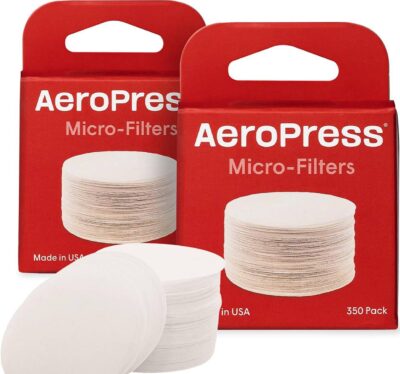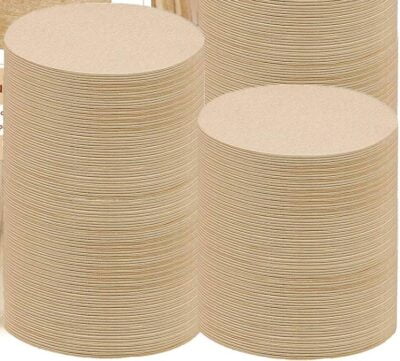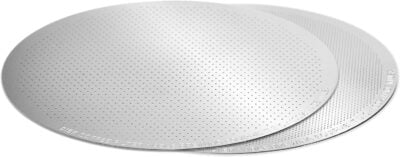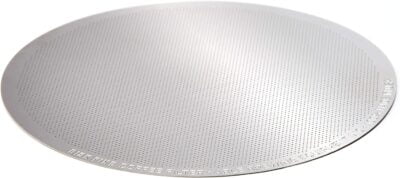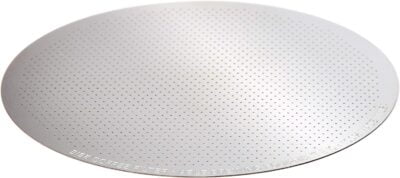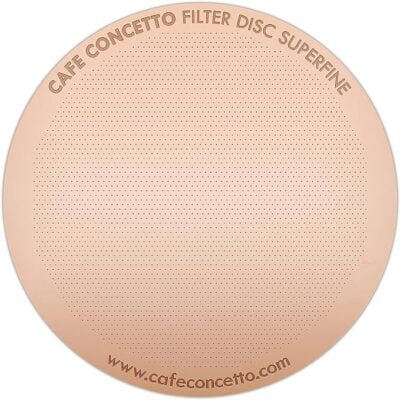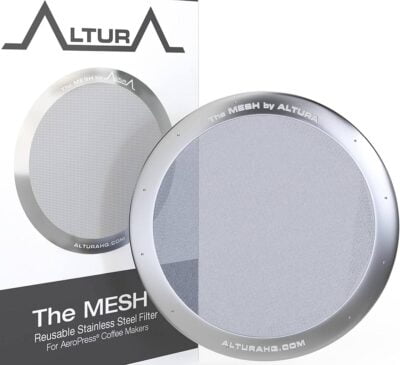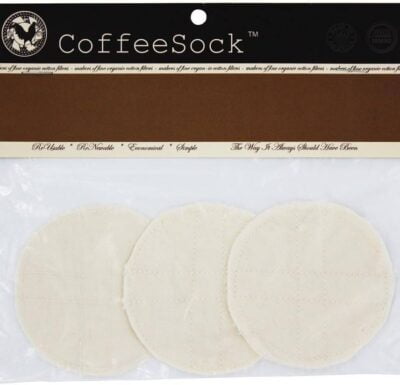Brewing with the AeroPress coffee maker is easy, and no matter how bad you screw up, you'd still get a drinkable cup. But most of AeroPress enthusiasts, coffee afficionados, and they have a deep love for perfect coffee. So, I think AeroPress' popularity, is not for how forgiving it is as a method, but rather for it's versatility and ability to brew out of the ordinary coffee.
Depending variables, you can brew anything from an espresso shot, to a mug of bright drip coffee. One of the way we can control the output is the filter. In this article we will look at how the filter type affects your cup, and what are the best filters for AeroPress.
Table of Contents
Choosing the Perfect AeroPress Filter
Filters play a vital role in controlling the extraction of your coffee grounds. Yes, their major role is to separate coffee grounds from your delicious coffee, but they are also one of the brew variables that can change the taste and flavor of your cup. Playing with the grind size and the type of filter, we can obtain various brews. So when we think of the best filter for AeroPress, we should rather think of “the best filter for AeroPress depending on your taste”.
With various options available, choosing the perfect Aeropress filter comes down to personal preference. Consider factors such as cost, taste preference, sustainability, and convenience when making your decision.
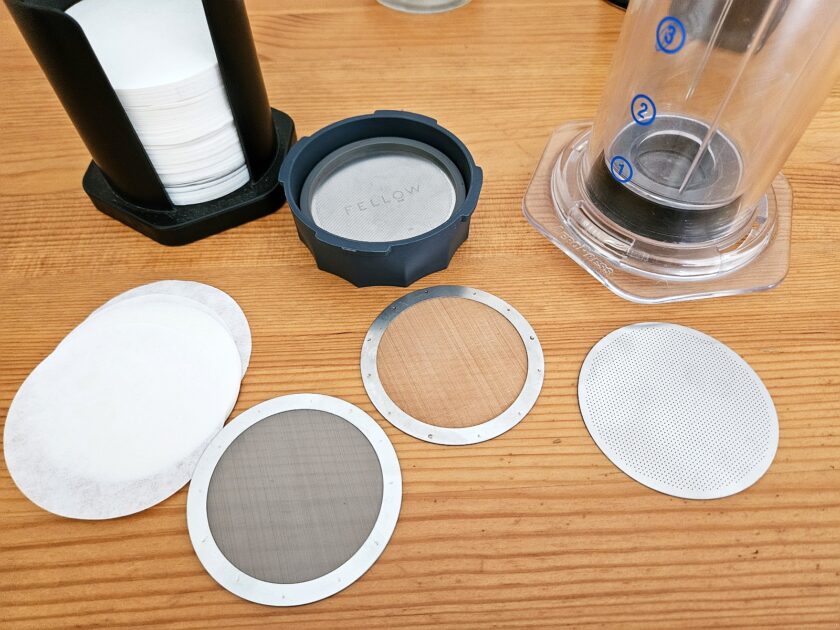
Depending on the material used to make them, we can classify filters in three categories: paper, metal, and cloth. Let's take a look at how these filters affect your cup, and then we can review some of the best ones on the market.
This guide will point you how the filter changes the coffee flavor, and recommends you types of filters depending on your taste. If the cup you get is not what you expect, don't blame it on the filter. Try to understand brewing variables, as this is where the problem is. Play with all variables: brew time, grind size, immersion time, plunge time, brew temperature, stirring, etc…
If you have the right filter, and the right recipe, you should be able to make some amazing cups of coffee.
Paper Filters
The paper filters for AeroPress are made of high-quality, food-grade paper that ensures a clean and bright cup. For drip coffee lovers, the paper filter is the best, since it can produce a coffee similar to Chemex, or the Hario V60, depending on the grind size and immersion time.
Paper is perfect for trapping fine particles and oils, which in turn will give you a smoother and less bitter cup of coffee.
They are easy to use and dispose of, offering convenience for quick cleanup.
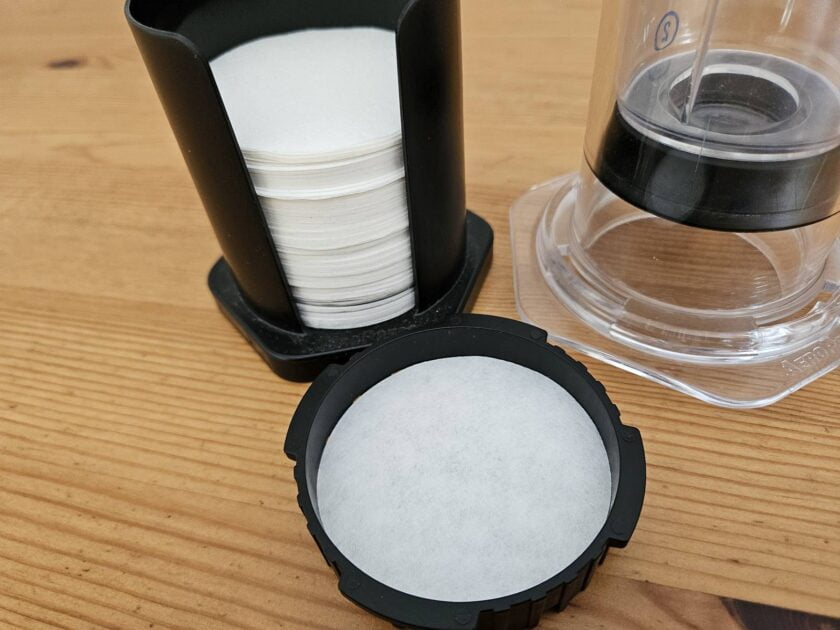
Pros and Cons of Paper Filters
Paper filters excel in delivering a clean, crisp flavor by trapping oils and fine grounds, ideal for appreciating subtle notes in single-origin coffees. They promote a healthier cup by filtering out harmful diterpenes and offer unparalleled convenience in use and disposal, streamlining your coffee routine. Their ability to consistently produce a grounds-free brew adds to their appeal.
However, the environmental toll of single-use paper filters is significant, contributing to waste. Over time, the cost of these disposable filters accumulates, making them less economical than reusable options. Concerns about the chemicals used in bleaching white paper filters, though minor, exist.
The choice between paper filters and alternatives hinges on personal preferences and priorities. In my time as a barista, I've noticed that many coffee enthusiasts gravitate towards paper filters for their cleanliness in flavor and ease of use. If your first attempt is a failure, don't give up, AeroPress is versatile. There are great chances you'll get it right, eventually. Experiment with brew time, and adjust it to suit your preferences.
Stainless Steel Filters
There are two types of stainless steel filters, perforated plate, and mesh filters. Although they offer a similar experience, the afficionados will tell you that they are different. The perforated plate filter has laser-cut 0.008 Micron holes, which deliver a rich, full-bodied coffee with noticeable sediment. On the other hand, the mesh filter features 123,000 holes per square inch which ensures a low-sediment, cleaner brew at a similar price.
In general, metal filter disks are durable and reusable, offering long-term cost savings and reducing waste.
They allow coffee oils and fines to contribute to the taste profile. Coffee brewed with metal disks is rich and bold, similar to espresso.
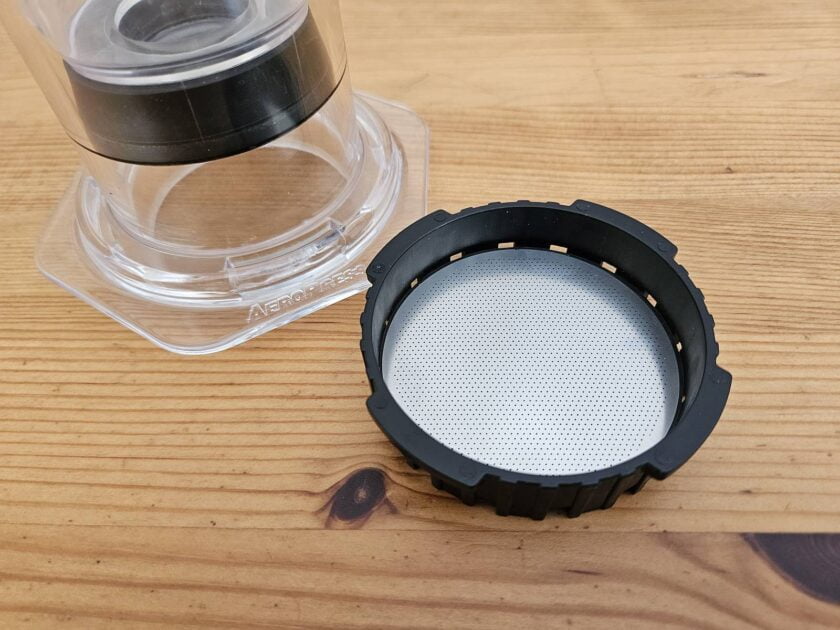
Metal Filters Pros and Cons
Metal AeroPress filters are celebrated for their durability, outlasting their paper counterparts and resisting damage. They're an eco-friendly choice, offering a sustainable alternative to disposable paper filters. Long term, they are cost-effective. Additionally, you can choose between the perforated plate, or the fine mesh, depending on you coffee taste.
Metal filters do require slightly more maintenance. They need daily cleaning, and the occasional deep cleaning. They allow more fines into the cup, and that is a deal breaker for some. While cost-effective in the long run, the initial cost is slightly higher compared to paper filters.
For the nitpicking perfectionists: metal retains heat, which influences the brewing process.
Lastly, compatibility can be an issue, as not all metal filters fit perfectly in all AeroPress models. You will need to be very careful when you buy it.
AeroPress Cloth Filters
Cloth filters, often made of cotton or hemp, offer a sustainable option for AeroPress brewing. They are durable and reusable, and that positions them as a great alternative to the paper filter. They retain less oils and fines than paper filters, but consistently more than the metal ones.
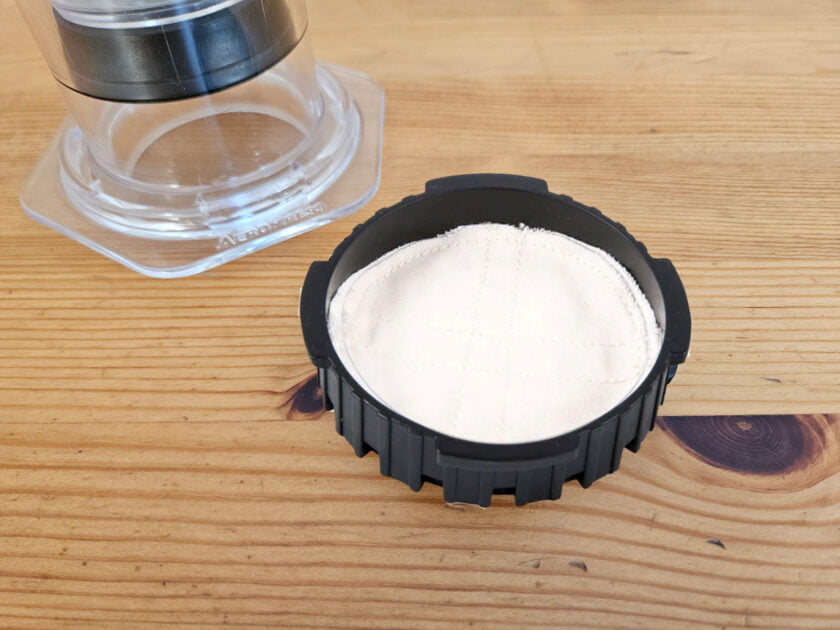
Cloth Filters Pros and Cons:
Cloth filters are appreciated for their ability to retain coffee oils and fines. They are an environmentally friendly alternative to single-use paper filters. In the long run, cloth filters prove to be cost-effective, despite a higher initial investment compared to paper filters. They provide a unique, gentle filtration process, contributing to a distinctively textured and tasteful cup of coffee.
For those with an exceptional palate, who can detect the off taste that paper filters impart, these are a great option. They have almost the same filtering capabilities, but no off taste.
The maintenance of cloth filters is considerable, even in comparison with the metal disk filters. They need thorough cleaning and proper drying after each use to avoid mold and off-flavors.
They are less durable than metal filters, so they they will need replacement from time to time. Over time, they can absorb flavors from different coffee beans, potentially altering the taste of subsequent brews.
Comparison and Reviews of Different AeroPress Filters
Paper Filters
Paper filters for the AeroPress are a popular choice among coffee enthusiasts due to their affordability and simplicity. Here are some notable paper filter brands in the market. With a reduced turbidity, compared to the metal ones, they are the option for drip coffee lovers.
Now that you have a little bit more info about choosing they right type of filter for your preferences, let's review some of the most popular one on the market.
On the other hand, paper filters impart a specific taste to your coffee, detectable by those with a great palate. You will need to pre-rinse them with hot water, in order to remove the off papery flavor.
The paper filter have a great advantage for those who have hypertension problems. They retain coffee oils, including the two diterpenes responsible for cholesterol spikes, cafestol and kahweol.
Review of Aesir AeroPress Filters
The regular AeroPress filters produce a slightly muddy cup. We talked about that bright cup, brewed with African beans. You cannot get that with the stock AeroPress paper filters. However, the Aesir filters are the perfect choice for the drip coffee lover who enjoys a Chemex.
Aesir paper micro-filters excel in significantly reducing cloudiness and haziness. Crafted from a denser, more consistent pulp, these filters have smaller pore sizes, preventing sediments and fines passing into your cup. This is particularly beneficial when brewing under pressure, where standard filters tend to become more porous and allow bitter compounds to seep through.
The Aesir filters deliver a cleaner, clearer cup, akin to pour-over coffee. This clarity and brightness bring out the delicate and nuanced flavors in quality lighter roasts. If you are looking to elevate your AeroPress AeroPress routine, the Aesir filters could be the most impactful single change, if you are looking for a brighter cup with fruity or floral notes.
Another difference between the Aesir filters and the standard ones is the diameter. The Aesir are only a fraction larger, just enough to fit snugly in the filter cap, and not fall when turning the unit upside down.
The Standard AeroPress Filter
The original AeroPress paper filters are the most popular choice among coffee lovers. Coffee brewed with the stock filters will make a cloudy, slightly fuller-bodied cup, than the Aesir filters. If you like a stronger drip coffee, these filters are your choice. Here is where you can buy them on Amazon.
The origin flavor notes will be muddied a bit by the fines, but not enough to mute these flavors completely.
SHIBADOU Paper Filters
SHIBADOU filters enable brewing a fuller-bodied coffee, a bit stronger that the standard AeroPress filters. They are a tiny bit larger than the stock filters, and that is why users love them. Made of unbleached paper, they are an inexpensive choice for those who like a stronger cup.
Stainless Steel Filters
When you look at buying a reusable metal filter, you will have to look at the design, and make sure the design aligns with your coffee preference. I am an espresso lover. I prefer espresso to drip coffee. So for me, the metal disk is the natural choice. But if you don't like strong coffee, you will probably have to rethink your priorities, and choose between your favorite brew, and your echo footprint.
The reusable metal filter is made from stainless steel, with a few that are plated steel.
From a flavor perspective, the most important feature is the size of the holes in the filter. That decides what cup are you going to get and influences you recipe. So we reviewed for you a few great options covering a wide hole size range.
Able Disk – Metal Plate AeroPress Filter
The Able Disk has established itself as a go-to option among metal AeroPress filters, with its products being designed and manufactured in the USA. There are two versions of the metal plate filter, one with smaller holes, and one with larger holes. Both disks are made from a single sheet of stainless steel with laser cut holes.
The Regular (or Standard) version has large holes, and it produces a rich, full-bodied coffee with a noticeable amount of sediment, though less intense than a French press cup. This filter is appreciated for the robust flavor profile it imparts to the coffee.
Responding to a demand for a filter with smaller holes, Able introduced the Disk Fine, featuring over twice the number of holes as the original, but two microns smaller. This design significantly reduces coffee sediment, catering to those who prefer a cleaner cup. This increased filtration comes with a tradeoff in durability; the Disk Fine's thickness is reduced considerably, making it more susceptible to bending or damage. The Fine version offers an alternative for those seeking a balance between a full flavor and a less gritty brew.
The Able disk is one of the oldest manufacturers on the market, and it's certainly one of the reputable companies that make perforated plate AeroPress metal filters.
Set
Single fine
Single standard
Cafe Concetto Filter for AeroPress
Cafe Concetto make the finest metal plate filter on the market. This is as close as possible to a paper filter, and in my opinion it filters better than the paper. Note that the filtration only retains fines, but not coffee oils, compared to the paper filter. This is a problem for those who need to pay attention to their cholesterol levels. But if you are healthy, those coffee oils will get you a new dimension in your flavor profile.
If you want to be ecologically responsible, but still drink a clean cup, this is you best option. This is a stainless steel coffee filter, with a nice looking Titanium coating.
When brewing with Cafe Concetto, you get a smooth coffee, that is sweeter and less bitter.
The Altura Mesh AeroPress Filter
Altura is one of the first companies to make an AeroPress mesh filter. They had a few iterations of the product, the current one being the result after many improvements.
The Altura is a filter that positions itself in between paper and metal plate. The cup it brews is slightly bolder and with a fuller body that the paper filter. Which is what many drip coffee lover want. Especially people who switch to AeroPress. There is going to be some coffee grit and most of the coffee oils in your cup. So if you like a perfectly clean cup, this isn't for you.
One problem with this filter is that you will need to use the inverted method. With the regular brewing method, coffee starts to drip right away, so the immersion part of the brew process is shortened. This is why you need to use the inverted method. But that is true for all metal filters, unless you are using a Fellow Prismo, or Aerobie's own flow control cap, a pressure actuated brew cap, that keeps the brew secured.
The only real problem withe the mesh filter is that sometime coffee grounds get stuck in the mesh, and you will have to use a brush to clean it.
Other Metal Filter Options
If you are looking for a full set of metal filters, Corretto has a three piece set, with two metal plate and one mesh. This will cover most of your brewing needs. Buy some paper filters as well and you can start a coffee shop. 🙂
Aerobie, the AeroPress manufacturer, has recently launched its own version of a metal filter. It is certainly a great option, and if you want Aerobie products exclusively, here is a link to their reusable metal plate filter.
Cloth AeroPress Filters
Cloth AeroPress filters allow a richer extraction than paper, but without the grit associated with metal filter. The cloth filters let only some of the coffee oils and almost no fines to pass through, resulting in a brew that's full-bodied and nuanced in flavor. This can be particularly noticeable with complex, single-origin coffees where the subtle notes are more pronounced.
The cloth's fine texture produces a smoother cup, with less grit than metal filters but more body than paper. Reusability is a key advantage of cloth filters; with proper care, they can last for many brews, offering a cost-effective and eco-friendly alternative to disposable filters.
Paper filters can impart a papery taste to your coffee, and afficionados can detect this. With cloth filters, you don't have any off-taste.
However, cloth filters require more maintenance than their paper or metal counterparts. They need to be thoroughly cleaned and dried after each use to prevent mold growth and flavor tainting. Over time, they can also absorb flavors from different coffee beans, which might influence the taste of subsequent brews. They are definitely not as durable as the metal counterparts. For coffee drinkers who prioritize convenience and minimal maintenance, cloth filters might not be the ideal choice. Yet, for those who want to be echo responsible and enjoy a coffee that is close to drip t, cloth filters are the best choice.
Other Filters
Other AeroPress filters include the pressure actuated cap. Fellow Prismp, JoePresso, the AeroPress Flow Control Filter are the most known devices.
These are a bit more complicated devices and we included them in our AeroPress accessories review article. They are a great option for those who don't like the inverted method. From my tests they don't improve the pressure obtained by much, at least not by a meaningful difference. So if you are looking to make an espresso with the AeroPress, forget about it. However, they are great additions to your brewing kit and they help in many ways.
Conclusion
After exploring the world of Aeropress filters, it's clear that finding the best one for your brewing needs is essential. By using an affordable, efficient, and sustainable filter, you can enhance your coffee experience and make a positive impact on the environment.
When choosing the perfect Aeropress filter, take into consideration your brewing preferences. Whether you prefer a rich and bold flavor or a clean and crisp taste, there is a filter out there that can meet your needs.
Additionally, make sure to keep your filters clean for optimal performance. Whether it's using a rinse or a gentle brush, maintaining your filters will extend their lifespan and ensure the best-tasting coffee.
Lastly, if you're torn between using a paper or stainless steel filter, consider the brew comparison. Each filter has its own advantages and limitations, so it ultimately depends on your personal preference and desired flavor profile.
Remember, the best AeroPress filter is the one that brings you joy with every sip. Choose wisely and enjoy your perfectly brewed cup of coffee!
